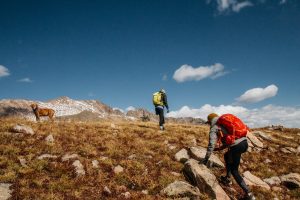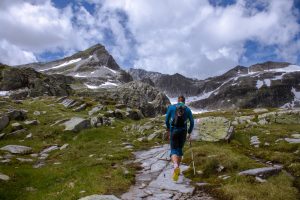If you feel great after hiking, you aren’t imagining things. Hiking has numerous benefits for your physical, mental, and social well-being, and there’s scientific backing that demonstrates just how great it is for you in all of these areas. In today’s largely sedentary world, it seems like a no-brainer that we should get outside more. After all, only about 12% of Americans spend time outside every day!
Between seated office jobs, internet-based remote work, indoor living spaces, and the amount of time we spend in our vehicles, a breath of fresh air is needed more than ever. And lots of people are recognizing this; since 2020, we’ve been in a hiking boom that shows no signs of slowing down.
From increasing physical fitness to improving mental health, and even aiding us in our social lives, hiking offers many solid benefits. Curious to know what they are? Here’s a look at the physical, mental, and social benefits of hiking – so the next chance you find yourself out in the woods on a hike, you’ll both feel excellent AND know why.
Why Try Hiking?
Before we get into a deep dive about our favorite benefits of hiking, let’s talk about why people should give hiking a shot. If you’ve never gone hiking before, it might seem intimidating– but hiking can be as easy as taking a walk on a local nature trail. Here are some of the great reasons you should consider giving hiking a try:
- Promotes physical fitness and cardiovascular health
- Enhances mental well-being and reduces stress
- Fosters a sense of adventure and exploration
- Strengthens social bonds through shared experiences
- Encourages a connection with the natural world
- Provides opportunities for solitude and self-reflection
- Supports environmental conservation efforts
- Offers a low-cost and accessible outdoor activity
- Can be adapted to various skill levels and fitness abilities
- Allows for a break from the hustle and bustle of daily life
But you don’t have to take our word for it– there’s a lot of great scientific evidence of the benefits of hiking. Here are some of the best things that hiking has to offer, with the proof to back them up!
Physical & Health Benefits of Hiking
The COVID-19 pandemic is cited as the catalyst for the current surge in hiking interest. Studies have found that in the US and across the world, more and more people are hiking who have never hiked before. Different demographics are exploring the outdoors for the first time, which is amazing! And while many people started getting out because hiking was one of the few activities that was considered safe during the early lockdowns, people have continued to hike because they’ve come to love the sport.

1. Hiking Gets You Fit
Like many forms of exercise, hiking can improve your cardiovascular health and physical strength. So what makes hiking more special than just walking? Hiking provides an element of cross-training because it is both a cardio activity and strength training all at once. Hiking also increases your balance and stability as you navigate various types of terrain, all while burning calories.
In this study, walking on uneven terrain like in hiking increases step width and length variability, joint mechanical work, and muscle co-activation compared with walking on smooth terrain. At the same time, metabolic output goes up. With that said, you’ve got a great, multi-functional workout to get you fit.
2. Hiking Can Lower Other Health Risks
Hitting the trail on a regular basis can keep your health in check and lower your risk of several health dangers. According to The National Heart, Lung, and Blood Institute, hiking can lower blood pressure by four to 10 points, and minimize the threat of heart disease, diabetes, and strokes for those with high risk factors
Don’t like the uphill but love the down? Well, there are some interesting studies showing hiking downhill can be effective at removing blood sugars and improving glucose tolerance. Researchers found that eccentric and concentric muscle movements may have different effects on your body in terms of glucose tolerance.* For lowering cholesterol, they found both the ups and downs (really any physical activity) have their perks. (AHA 2004 Scientific Sessions: Abstract 3826. Presented Nov. 10, 2004)
3. Hiking May Help Prevent And Assist in Recovery of Cancer
Oxidative stress is believed to be a strong factor in the onset, progression, and recurrence of cancer. This study in the International Journal of Sports Medicine looked to investigate how oxidative stress is influenced by physical activity like hiking or mountaineering. Researchers measured oxidative stress and antioxidative capacity in 12 women with breast cancer and 6 men with prostate cancer, before and after long hiking trips. Their data concluded that long-distance hiking trips can improve the antioxidative levels of oncological patients.
Although it can’t be said that hiking cures cancer, it may be a positive asset to prevention and recovery. This along with many other studies, has led various organizations to create exercise programs for cancer patients to aid in recovery, improvement in life quality, improvement of fall risks, and many other factors.
Mental Benefits of Hiking
Hiking is great for your physical health, but that’s not actually why most people get into it.
A study of the reasons that people hike shows that the primary motivations for hiking are relaxation, discovery, and enjoyment– all of which contribute to a profound sense of well-being and a deeper connection with the natural world.
4. Hiking in Nature Decreases Brooding and Ruminating Thoughts
Brooding repeatedly over negative thoughts about the self can lead to depression, anxiety, and other debilitating mental health issues. There is good news to report though in this recent study on whether spending time in nature affects rumination.
When comparing two groups of people – one who hiked through a nature environment for 90 minutes and another who walked in an urban environment for the same time – researchers found that hiking in nature decreased the negative, obsessive thoughts about the self. The nature group also had lessened neural activity in the subgenual prefrontal cortex, which is affiliated with mental illness.
Getting outside and hiking can be one of the best ways to increase endorphins (those feel-good hormones), which can help to offset depression. Moving the body is also a great way to release energy that may be going toward anxiety. When in doubt, move and breathe in the fresh air.
5. Hiking Can Increase Brainpower
Hiking as a form of exercise stimulates neurogenesis, which is the growth of new neurons. This article discusses how ‘brain-derived neurotropic factor’ (BDNF) is released by exercise. BDNF can support cognitive improvement and the reduction of depression and anxiety. Think of hiking as a way to positively nourish and nurture your brain.
Want to sharpen your memory skills? Reports have demonstrated how hiking and being in nature has a memory-promoting effect that walking in urban areas does not. This study done at the University of Michigan had participants perform a series of memory cognition tests, and then they were sent out for a walk: one group around an arboretum and the other down a busy city street.
When the memory tests were repeated after they got back, the results showed that people’s performance on the test improved by almost 20% after wandering amongst the trees, while those walking on a busy street did not improve on the test.
6. Hiking Can Enhance Creative Problem-Solving
Truth be told, many of us spend a lot of time on technology and less time with nature. This interesting research article highlights how creative problem-solving can be enhanced by disconnecting from technology and reconnecting with nature.
Participants did not use technology while backpacking in nature for four days while doing tasks that asked for creativity and problem-solving abilities. It was concluded that this separation from media and technology increased performance on a creative, problem-solving task by a big 50% in a group of hikers.
The constant noise in urban areas and being immersed in technology can tax our cognitive abilities, due to the overwhelming stress of being constantly ‘on.’ Hiking in nature allows our mental facilities to slow down, recharge, and discover new ways of handling situations.
7. Hiking and ‘Forest Bathing’ Can Lower Stress
All hikes are not created equal, and that’s okay. Sometimes we go out for a hard climb, and other times we want more of a leisurely stroll so we can take breaks and immerse in the beautiful surroundings around us.
Perhaps you’ve heard the term ‘Forest Bathing’, which has received some worthy attention these days. In Japan, a forest bathing trip, called “Shinrinyoku,” is a leisurely visit to a forest. It has now become a recognized relaxation and/or stress management activity in Japan, according to this study on the effect of forest bathing trips on human immune function.
Other studies have shown that being in nature and hiking can lower levels of cortisol, a hormone used as a stress indicator. With the wealth of forests and nature we have access to in the US, forest bathing can easily be practiced here as a way to reduce stress while out on a hike.
Social Benefits of Hiking
For many people, hiking is an enjoyable social activity. It’s safer to hike with a buddy, and hiking can be a great way to meet with like-minded people. Here’s how hiking can help you make important connections.

8. Hiking Lets You Relate With Real People
With all of the social media platforms out there, do we ever connect with actual people anymore? Calling up a friend to go out on a day hike gives you the precious gift of face-to-face connection, something that can be lacking in our society. So much time is spent scrolling on Instagram looking at gorgeous vistas – get out there with a friend and find one!
Don’t have any hiking buddies? No worries, you can use a site like MeetUp that links you with other like-minded, outdoorsy folks.
It can also be fun to just get out there and see who you meet. Strangers only are strangers until you talk to them and get to know each other while on the trail. Many people who choose long-distance adventures like the Appalachian Trail get out there wanting to meet people and connect in a deep, meaningful way with a shared goal.
This fosters building community and going beyond social barriers that often hold us back. Lifetime friendships can be made when we get on trail and relate to others while sharing profound experiences. And hiking with friends isn’t just more fun– it actually makes the hike seem easier!
In this study from the University of Virginia, college students were taken to a hill, given a weighted backpack, and asked to estimate its steepness. Participants who stood alone saw the hill as steeper and more challenging; participants who prepared to tackle the hill saw it as less steep.
9. Hiking Helps You Unplug
Technological devices consume many of us, due to work, social ties, and more. According to The Office for National Statistics in 2017, the obsession with mobile phones and the like has led to a 13 percent decline in time spent with friends over the last 15 years. In addition, the average (American) adult spends at least four hours a day on their mobile phone.
This data certainly isn’t meant to make anyone feel bad, and no judgments are being made. Rather, the intention is to bring light to the fact that hiking can be a fantastic way to take a little time to separate from devices by unplugging. You can then have more quality time with friends, and family, or even enjoy peace and quiet with yourself. And when you do reconnect, you may have more perspective in choosing the ways that count to you.
Hiking is one of the most satisfying ways we can take care of ourselves physically, mentally, and socially. It gives us the opportunity to move our bodies, free up space in our minds, and bond with others. The evidence is clear – hiking truly does benefit all the pieces of you.
Heather Rideout has been a life-long outdoors woman. Her pursuits and passion with hiking and camping have taken her around the world for many long distance trips; such as backpacking in Nepal, India, South America, Morocco, Europe, and North America. Heather has hiked the Appalachian Trail, 2,250 miles of the Pacific Crest Trail, and a route of 1,500 miles combining several Camino routes through Spain and Portugal. She has been a blogger for ‘The Trek,’ and recorded an episode with one of her outdoor stories for the podcast ‘Out There.’ Heather shares some of her writing on her website, www.wanderyoga.com

